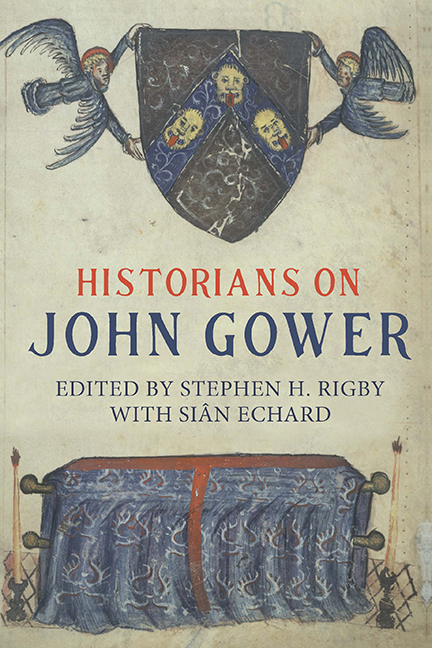Book contents
- Frontmatter
- Dedication
- Contents
- List of Illustrations
- Notes on Editors and Contributors
- Acknowledgements
- List of Abbreviations
- A Note on the References
- Preface: Gower in Context
- PART I Gower’s Life and Works
- PART II GOWER AND LAY SOCIETY
- PART III GOWER AND THE CHURCH
- PART IV GOWER AND GENDER
- PART V GOWER AND POLITICS
- PART VI GOWER AND COSMOGRAPHY
- Select Bibliography
- Index
- VOLUMES ALREADY PUBLISHED
2 - Gower’s Works
Published online by Cambridge University Press: 26 May 2022
- Frontmatter
- Dedication
- Contents
- List of Illustrations
- Notes on Editors and Contributors
- Acknowledgements
- List of Abbreviations
- A Note on the References
- Preface: Gower in Context
- PART I Gower’s Life and Works
- PART II GOWER AND LAY SOCIETY
- PART III GOWER AND THE CHURCH
- PART IV GOWER AND GENDER
- PART V GOWER AND POLITICS
- PART VI GOWER AND COSMOGRAPHY
- Select Bibliography
- Index
- VOLUMES ALREADY PUBLISHED
Summary
The Difficulties of Dating Gower's Works
Given Gower's explicit references to historical events such as the papal schism, the Great Revolt of 1381 and the deposition of Richard II, historians and literary scholars have inevitably sought to relate his poetry to the religious, social and political conflicts and controversies of his day. Yet, a major difficulty in adopting this historical approach to Gower's works is the uncertainty which persists about the chronology of their composition. Some of Gower's poems can be dated with precision. For instance, his Carmen Super Multiplici Viciorum Pestilencia, which sets out the ‘manifold plague of vices’, including heresy, pride, lust, perjury and greed, from which England was supposedly suffering, explicitly states that it was written in the twentieth year of Richard II's reign, i.e. 1396–97 (pr. 8; ll. 312–3). Similarly, in alternative versions of Quicquid Homo Scribat (In Fine) in which Gower takes leave of writing in old age, he refers to himself as having gone blind in the first or second year of Henry IV's reign (ll. 1–8), i.e. in 1399–1400 or 1400–01, with the work presumably dating shortly after this date. However, if a marginal note in a manuscript of Presul Ouile Regis is to be believed, this poem's account of the misfortunes striking the kingdom can be linked to the great comet visible across Europe in 1402 which was widely interpreted as an omen of disaster. As Yeager points out, Gower's blindness does not, despite the poet's claims to the contrary, seem to have stopped him from writing and his complaints may have been a ‘conscious pose for literary purposes’ rather than an accurate reflection of his ability to work
Other works by Gower offer a less specific indication of their date of composition, as in the prose headings to three of the four manuscripts of O Deus Immense which claim that the poem's warnings about the need for kings to take good counsel, obey the law and win the love of his subjects (ll. 7, 9–18, 58, 65–6) were written whilst Richard II was still alive. Sometimes, biographical details in the poems can help with their dating, assuming, of course, that the first-person voice within the text can be equated with that of Gower himself.
- Type
- Chapter
- Information
- Historians on John Gower , pp. 121 - 138Publisher: Boydell & BrewerPrint publication year: 2019



